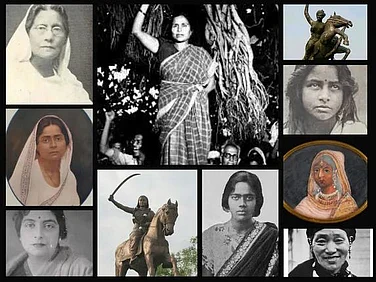When youth began to blossom at a young age, a brave freedom fighter gave his life to free his motherland and continue to inspire generations. His sacrifice and fire of patriotism inspired millions of people, and only because of such courageous hearts, we are breathing in this nation. Well, not to be surprised, we are talking about Khudiram Bose, the heroic Khudiram Bose, an indelible name etched in the history of India’s freedom struggles who sacrificed his life at the youngest age of 18 years. Bose has set a huge example of how fearless and headstrong he is for independence at such a young age.
Khudiram Bose: The Youngest Martyr Who Ignited The Flame Of Indian Independence
We are talking about Khudiram Bose, the heroic Khudiram Bose, an indelible name etched in the history of India’s freedom struggles who sacrificed his life at the youngest age of 18 years. Bose has set a huge example of how fearless and headstrong he is for independence at such a young age.

Early life and influence
Born on December 3, 1889, in a small village named Habibpur, Midnapore district in Bengal (now in West Bengal), Khudiram was the fourth child of his parents, Tralokyanath Bose and Lakshmipriya Devi. Unfortunately, he lost his parents at the age of six. After that, he came into contact with a revolutionary group named ‘Anushilan Samiti’ and committed his time and life for the sake of Indian independence. During that time, he became a volunteer at the age of 16 and got arrested for distributing pamphlets against British India, but he managed to escape from the prison.
Inspired by the revolutionary vehemence of the time, Bose was heavily influenced by the nationalist sentiments sweeping across Bengal. He was also involved in planting bombs near the police station and targeting British officials. It is said that Bose was inspired by the works of Bankim Chandra Chatterjee and the blazing speeches of Aurobindo Ghosh, which later changed his life in several ways and pushed him towards revolutionary activities.
Role of Khudiram Bose in freedom: The Muzaffarpur Conspiracy
Khudiram is actively part of any events related to independence. His contribution is noticeable and unforgettable. The turning point of his life came in 1908 when he was 18 years old. It was April 30, 1908, when Bose and his revolutionary fellows hatched a plan to murder Douglas Kingsford, who was the Chief Magistrate of the Presidency Court of Calcutta, known for his harsh and cruel sentences against Indian Nationalists of Bengal.
Khudiram and his comrade Prafulla Chaki embarked on a fearless mission to assassinate the judge. The day was horrible in the history of independence. They threw a bomb at a carriage, considering Magistrate Kingsford must be inside, but unfortunately, it was a different carriage, and they mistakenly targeted the wrong vehicle, resulting in the tragic deaths of two young, innocent women.
Tragically, the carriage was occupied by the wife and daughter of a British barrister, Pringle Kennedy, who was killed in the explosion. This incident caused widespread outrage and led to a massive manhunt for the perpetrators.
Both of them managed to escape. After walking 25 miles, Bose reached Waini station, where he looked suspicious and was detained by the constables. At present, in the memory of courageous Khudiram Bose, the Waini station is known as Khudiram Bose Pusa Station.
Prafulla Chaki, his friend, committed suicide while trying to escape; he shot himself in front of the police. Bose was caught and put on trial. The trial began on May 21, 1908, when he accepted his responsibility for the act to save his compatriot from the inevitable threat of gallows.
Despite multiple offers of escape, Khudiram rejected them, reflecting the spirit of sacrifice and courage. Khudiram approached the trial with an unshakable commitment. His trial received enormous attention, and despite attempts by his defence team, Khudiram was sentenced to death.
Martyrdom and Legacy

On August 11, 1908, at the age of just 18, in the central jail of Muzaffarpur, the heroic Khudiram Bose was hanged to death for the attempted assassination of the Magistrate. It is said that when he was hanged to death, he wore new clothes, was smiling, and carried the Bhagwat Gita with him.
His martyrdom has left a permanent mark on the history of independence and galvanized the nation, fueling the revolutionary movement. Bose was one of the youngest revolutionaries in India. His epic and courageous sacrifice will never be forgotten, and he was a source of inspiration for infinite freedom fighters who followed in his footsteps. The remarkable events in Khudiram's life continue to inspire and amaze. His steadfast courage, unselfish act of accepting responsibility, and unwavering patriotism strike a chord with individuals of all ages.
His sacrifice serves as a daily reminder of the cost of freedom as well as the imperative of protecting justice and equality. We should not forget the sacrifice and efforts every freedom fighter and unsung hero has made for the independence of the nation. Khudiram Bose’s story will always be in our hearts and will continue to inspire and guide future generations, reminding them of the power of youth and the importance of standing up against oppression.
-
Previous Story
 Vande Mataram: The Revolutionary Anthem Born From Bankim Chandra Chatterjee's Vision
Vande Mataram: The Revolutionary Anthem Born From Bankim Chandra Chatterjee's Vision - Next Story













.png?w=200&auto=format%2Ccompress&fit=max)
.png?w=200&auto=format%2Ccompress&fit=max)




